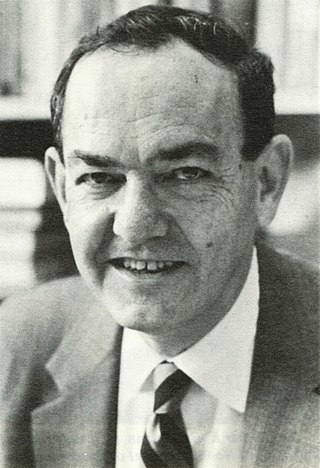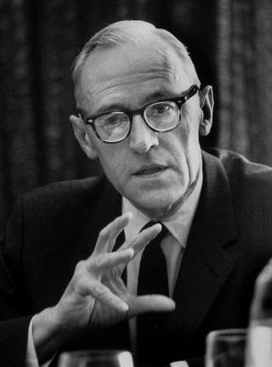Related Research Articles

Herbert Alexander Simon was an American political scientist whose work also influenced the fields of computer science, economics, and cognitive psychology. His primary research interest was decision-making within organizations and he is best known for the theories of "bounded rationality" and "satisficing". He received the Nobel Memorial Prize in Economic Sciences in 1978 and the Turing Award in computer science in 1975. His research was noted for its interdisciplinary nature and spanned across the fields of cognitive science, computer science, public administration, management, and political science. He was at Carnegie Mellon University for most of his career, from 1949 to 2001, where he helped found the Carnegie Mellon School of Computer Science, one of the first such departments in the world.

Economic history is the study of history using methodological tools from economics or with a special attention to economic phenomena. Research is conducted using a combination of historical methods, statistical methods and the application of economic theory to historical situations and institutions. The field can encompass a wide variety of topics, including equality, finance, technology, labour, and business. It emphasizes historicizing the economy itself, analyzing it as a dynamic entity and attempting to provide insights into the way it is structured and conceived.

A gratuity is a sum of money customarily given by a customer to certain service sector workers such as hospitality for the service they have performed, in addition to the basic price of the service.

Vernon Lomax Smith is an American economist and professor of business economics and law at Chapman University. He was formerly a professor of economics at the University of Arizona, professor of economics and law at George Mason University, and a board member of the Mercatus Center. Along with Daniel Kahneman, Smith shared the 2002 Nobel Memorial Prize in Economic Sciences for his contributions to behavioral economics and his work in the field of experimental economics. He worked to establish 'laboratory experiments as a tool in empirical economic analysis, especially in the study of alternative market mechanisms'.

Behavioral economics is the study of the psychological, cognitive, emotional, cultural and social factors involved in the decisions of individuals or institutions, and how these decisions deviate from those implied by classical economic theory.

Oskar Morgenstern was a German-born economist. In collaboration with mathematician John von Neumann, he founded the mathematical field of game theory as applied to the social sciences and strategic decision-making.

Richard H. Thaler is an American economist and the Charles R. Walgreen Distinguished Service Professor of Behavioral Science and Economics at the University of Chicago Booth School of Business. In 2015, Thaler was president of the American Economic Association.

Sendhil Mullainathan is an American professor of Computation and Behavioral Science at the University of Chicago Booth School of Business and the author of Scarcity: Why Having Too Little Means So Much. He was hired with tenure by Harvard in 2004 after having spent six years at MIT.
The dictator game is a popular experimental instrument in social psychology and economics, a derivative of the ultimatum game. The term "game" is a misnomer because it captures a decision by a single player: to send money to another or not. Thus, the dictator has the most power and holds the preferred position in this “game.” Although the “dictator” has the most power and presents a take it or leave it offer, the game has mixed results based on different behavioral attributes. The results – where most "dictators" choose to send money – evidence the role of fairness and norms in economic behavior, and undermine the assumption of narrow self-interest when given the opportunity to maximise one's own profits.

Robert Harris Frank is the Henrietta Johnson Louis Professor of Management and a professor of economics at the Samuel Curtis Johnson Graduate School of Management at Cornell University. He contributes to the "Economic View" column, which appears every fifth Sunday in The New York Times. Frank has published on the topic of wealth inequality in the United States.

Leftovers are surplus foods remaining unconsumed at the end of a meal, which may be put in containers with the intention of eating later. Inedible remains like bones are considered waste, not leftovers. Depending on the situation, the amount of food, and the type of food, leftovers may be saved or thrown away.

Barry Schwartz is an American psychologist. Schwartz is the Dorwin Cartwright Emeritus Professor of Social Theory and Social Action at Swarthmore College and since 2016 has been visiting professor at the University of California, Berkeley. His work focuses on the intersection of psychology and economics. He frequently publishes editorials in The New York Times, applying his research in psychology to current events. Schwartz's research addresses morality, decision-making and the inter-relationships between behavioral science and society. His books criticize certain philosophical roots of Western societies and expose underlying myths common in both lay and academic psychological theories. In particular, he is a critic of the "rational economic man" model in both psychology and economics. Schwartz studied under David Richmond Williams for his PhD at the University of Pennsylvania where he was a predoctoral fellow with National Science Foundation.

John August List is an American economist known for establishing field experiments as a tool in empirical economic analysis. He works at the University of Chicago, where he serves as Kenneth C. Griffin Distinguished Service Professor; from 2012 until 2018, he served as Chairman of the Department of Economics. Since 2016, he has served as Visiting Robert F. Hartsook Chair in Fundraising at Indiana University Lilly Family School of Philanthropy. List is noted for his pioneering contributions to field experiments in economics, with Nobel prize winning economist George Akerlof and noted law professor Cass Sunstein writing that "List has done more than anyone else to advance the methods and practice of field experiments." Nobel prize winning economist Gary Becker quipped that "John List's work in field experiments is revolutionary."

Alvin Eliot Roth is an American academic. He is the Craig and Susan McCaw professor of economics at Stanford University and the Gund professor of economics and business administration emeritus at Harvard University. He was President of the American Economic Association in 2017.
Bart Wilson is an experimental economist. He holds the Donald P. Kennedy Endowed Chair of Economics and Law in the Chapman University, Argyros School of Business and Economics. He is also the director of the Smith Institute for Political Economy and Philosophy and teaches courses in humanomics. His work has been widely published in both the popular and academic press.
Jay P. Greene is a senior research fellow at The Heritage Foundation. He was previously a distinguished professor and head of the Department of Education Reform at the University of Arkansas.
Robert Eisner was an American author and William R. Kenan professor of economics at Northwestern University. He was recognized throughout the United States for his expertise and knowledge of macroeconomics and the economics of business cycles. He was a regular contributor to the Wall Street Journal, The New York Times, Chicago Tribune, and The Los Angeles Times, primarily covering national economic policy and reform.
The Journal of Behavioral and Experimental Economics is a bimonthly peer-reviewed academic journal covering behavioral and experimental economics. It was established in 1972 as the Journal of Behavioral Economics, and was renamed the Journal of Socio-Economics in 1991. It obtained its current name in 2014. The editor-in-chief is Pablo Branas-Garza. In 2013-2021 its Editor was Ofer Azar. According to the Journal Citation Reports, the journal has a 2021 impact factor of 1.831.
Urs Fischbacher is a Swiss economist and professor of applied economic research at the University of Konstanz. He is director of the Thurgau Economic Institute, an affiliated institute of the University of Konstanz. He pioneered the field of software tools for experimental economics.

Michael "Miki" Bar-Eli is an Israeli psychologist, Emeritus Professor who held the Nat Holman Chair in Sports Research at the Faculty of Business and Management, Ben-Gurion University of the Negev, Beer-Sheva.
References
- 1 2 "Ofer H. Azar". Journal of Behavioral and Experimental Economics. Elsevier.
- ↑ Mullainathan, Sendhil (2016-02-12). "How to Pinch Pennies in the Right Places". New York Times.
- ↑ Davis, Noah (2013-11-06). "Why Do We Still Tip?". Pacific Standard.
- ↑ Ariely, Dan (2017-01-06). "Would the End of Tipping Mean the End of Good Service?". Wall Street Journal.
- ↑ Ferro, Shaunacy (2013-08-01). "Why People Love Tipping Waiters". Popular Science.
- ↑ Wachter, Paul (2008-10-09). "Why Tip?". New York Times Magazine.